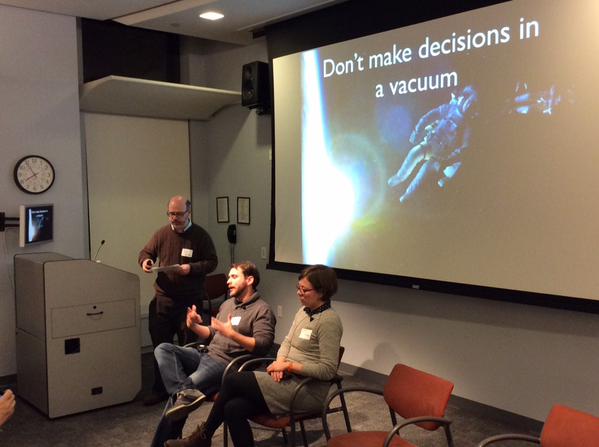‘Culture of accuracy’ needed as journalists work fast and alone
Journalists can work quickly and independently without sacrificing accuracy, a panel of leading breaking news editors and journalism educators —

Journalists can work quickly and independently without sacrificing accuracy, a panel of leading breaking news editors and journalism educators said at a forum at the CUNY Graduate School of Journalism in New York Feb. 26.
Among the takeaways:
- Publishers and top editors must show they value accuracy, not just traffic.
- Journalists should own their mistakes and be very good at making corrections and drawing attention to them.
- News sites fail most often when they try to present something as the “whole story,” complete with sexy headline, when they really only have part of it.
- There are specific tactics for verifying and presenting rumors and emerging breaking news tips that reporters and editors should learn.
Corner Media's managing editor, Mary Bakija, and senior editor, Ned Berke (a LION Publishers board member and founder of Sheepshead Bites, which was acquired by Corner Media in July 2014), offered tips on how small local news sites can emphasize accuracy without the luxury of copy editors and fact checkers."
“If you’re doing it all by yourself, you can’t be terrified of mistakes, or ashamed of mistakes either,” Berke said. You have to “own up to it” and explain to readers “how it went wrong, why it went wrong.”
“It seems counterintuitive, but the more you are willing to admit your errors, the more people will trust you,” said Craig Silverman, of Regret the Error fame and author of a recent Tow Center report called “Lies, Damn Lies and Viral Content: How News Websites Spread (and Debunk) Online Rumors, Unverified Claims and Misinformation.”
Bakija said that “not having a lot of backup” is a fact of life for independent local news publishers. “A lot of stuff goes out without another set of eyes,” she said.
The same goes for all kinds of news sites these days.
“Fact checkers are almost extinct as a breed … Not only that, we have fewer editors, by far,” said Jeff Jarvis, director of CUNY’s Tow-Knight Center for Entrepreneurial Journalism.
Jarvis and other speakers at “Getting It Right: How Digital Journalists Can Address the Media Accuracy Crisis” said that how the media handles mistakes after they’re made is almost as important as avoiding them in the first place.
“One thing we’ve done in the business is act like we’re perfect when we’re not,” he said.
David Clinch, global news editor at Storyful, a News Corp.-owned breaking news verification service, said that breaking news reporters need to get in the mode of reporting what they know quickly and then adding to the story from there.
The biggest accuracy problems happen when sites present sketchy, unverified or incomplete information as a finished product of some kind with a headline that jumps to conclusions.
“The problem is when you start pretending, you present this false veneer …” that you have the “whole story,” said Chris Glazek, executive editor of Genius, a website annotation startup, and a former fact checker at the New Yorker.
Jere Hester, who runs CUNY’s NY City News Service, said journalists have a duty to be skeptical, and the speed of news today is no excuse not to be.
Clinch said “you’re missing the opportunity to get a better story” by not digging deeper into who a source is, how they know what they are tipping you to, or how a viral video originated.
“Trust no one and verify everything,” Clinch said, “and that includes the government,” and even your own reporters.
Barbara Gray, CUNY’s director of research, offered this simple list of questions about sourcing: “Who says? Who are they? How do they know? What is their authority? Are they biased?”
She also suggested that reporters and editors study and utilize Silverman’s verification handbook and an accuracy checklist created by longtime journalist, blogger and educator Steve Buttry.
Matt DeRienzo is interim executive director of LION publishers. Follow him on Twitter at @mattderienzo. Email him at [email protected].
Sign up for the weekly newsletter
Join the LION mailing list to get our weekly roundup of opportunities and resources for news entrepreneurs. View our most recent issues.
Related Articles
BoiseDev’s winning secret to selling newsletter ads: Only local news, only local ads
The site earns 60 percent of its advertising revenue through its high-open-rate email projects, in partnership with local ad agencies.
AI adoption: How Lede AI helps small publishers quickly generate content readers love
Helping news organizations leverage artificial intelligence with a tool that puts their readers and staff first
Social is down, newsletters are up: How audiences are finding LIONs in 2024
Changes to social media and search prompt publishers to shift strategy.
